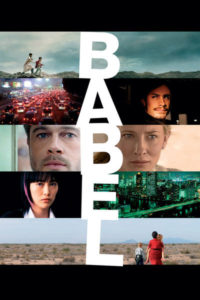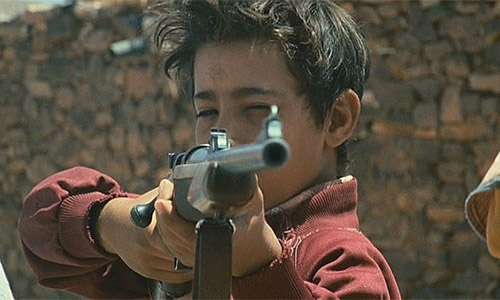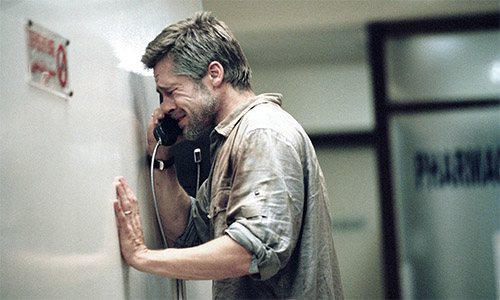 More than a decade before earning back-to-back Best Director Oscars (Birdman, The Revenant), Alejandro Gonzalez Inarritu directed a series of unrelated hyperlink films. The idea behind hyperlink movies is that you have a movie that tells completely different stories in entirely different settings but is connected or influenced in ways unknown to the characters (and, for periods, the audience). These films started gaining popularity with the success of Steven Soderbergh’s Traffic in the year 2000. When done correctly, hyperlink films can be incredibly memorable. Traffic won four Academy Awards and was a favorite for Best Picture in 2000.
More than a decade before earning back-to-back Best Director Oscars (Birdman, The Revenant), Alejandro Gonzalez Inarritu directed a series of unrelated hyperlink films. The idea behind hyperlink movies is that you have a movie that tells completely different stories in entirely different settings but is connected or influenced in ways unknown to the characters (and, for periods, the audience). These films started gaining popularity with the success of Steven Soderbergh’s Traffic in the year 2000. When done correctly, hyperlink films can be incredibly memorable. Traffic won four Academy Awards and was a favorite for Best Picture in 2000.
Crash maxed out on the hyperlinked film method four years later, earning six Oscar nominations and taking home three awards, including Best Picture. Inarritu’s first hyperlink (and first feature-length) film, Amores Perros, wasn’t marketed and was missed by many. While receiving high marks from critics, it earned less than $5 million at the box office and has yet to be a movie many people have gone back and seen, despite the success of his two Oscar-winning movies. I watched Amores Perros after a friend recommended it, but I did not love it. Inarritu’s second endeavor, 21 Grams, was loaded with Hollywood A-listers (Sean Penn, Naomi Watts, Melissa Leo, Benicio Del Toro). It also resonated with critics (80%) and audiences (86%) but earned just $16 million domestically. I also saw 21 Grams and found it to be incredibly dull.
His third movie, 2007’s Babel, is easily his best hyperlink movie and, in my opinion, his second-best overall (behind The Revenant, which is my favorite movie of all time). While just 69% of critics gave it a favorable rating (77% of the audience), it earned seven Academy Award nominations (winning one), including Best Picture and Best Director. For those who see this movie and don’t like it because of its pace or length (or for whatever other reason), I won’t try to talk you out of it. It’s certainly not for everyone. And while the overall story and the arching angle weren’t the most complex or even the most interesting, the acting was top-notch, with some of the biggest Hollywood heavyweights bringing their A-game. At the same time, unknown actors took center stage and made a name for themselves.

Here’s what you need to know in a “what could go wrong will go wrong” story. A businessman from Japan trying to deal with the suicide of his wife goes on a hunting trip to Morocco. At the end of his journey, he tips his guide with the rifle he brought from Japan on the trip. The guide who he gives it to sells it to a friend who will use it with his two young boys (probably ages 8 and 10?) to keep the jackals away who are attacking his sheep. In Morocco, an American woman (Cate Blanchett – Blue Jasmine, Carol), traveling with her husband (Brad Pitt – Seven, The Curious Case of Benjamin Button), is critically wounded after being shot through the window of the tour bus that she is traveling on with other Americans. This results in the couple not returning home to San Diego when they promised their nanny Amelia (Adriana Barraza – Amores Perros). Not wanting to miss her son’s wedding in Tijuana, Amelia takes the couple’s young son Mike and daughter Debbie (Elle Fanning – Maleficent, Super 8) across the border with her nephew Santiago (Gael Garcia Bernal –Desierto, The Motorcycle Diaries). In Japan, a rebellious and sexually frustrated teenager acts out after her mother’s death and the absence of her father. None of these strangers will ever meet; despite their sudden, unlikely connection, they will all remain isolated due to their inability to communicate meaningfully with anyone around them.
Babel succeeded in this hyperlink-style movie, whereas so many others have failed. With this kind of movie style, there are two options. You could end up with a masterpiece if you have a skilled director, the right script, and actors who understand how to tell just part of a story. It might not be as eye-opening in uniqueness as Babel, Crash, or Traffic, but a great movie will be a great one nonetheless. The flip side of that is a movie that goes virtually nowhere, where the script either entirely loses you or needs to care more about the story or the characters involved. There are plenty of hyperlink movies (with great actors) that you have never heard of. There are plenty of others that you’ve probably seen, but they were executed so poorly that you didn’t even think they were hyperlink movies. Babel, by definition, is a confused noise made by many voices.
In Babel, the movie, we have stories that take place in Morocco, America, Mexico, and Japan, and in each of these locations, there is at least one character who doesn’t speak the native language. I liked the Moroccan story more than anything else, and I think this is what Iñárritu. This was his lead story. This is the story that he returned to most often. This was the story that he secured his A-talent actors. Pitt and Blanchett have instant chemistry on the screen. The Curious Case of Benjamin Button is one of the greatest stories ever told on film. In Babel, Richard (Pitt) will do anything to save his wife Susan (Blanchett) after being shot on a tour bus by a stray bullet. This is thought instantly to be a terrorist act, but Morocco denies having terrorists in its country and refuses to send a helicopter to the small town where the tour bus is stationed. The angry and incredibly hot (the bus driver refuses to turn on the air conditioning because he wants to save gasoline) wants out, but Richard pleads with them not to be left alone.
A local man is doing the best he can to care for Susan with Richard, but she needs immediate medical care to remove the bullet and heal the wound. The panic Richard portrays in doing everything within his power and some outside it to save his wife is acting at its best. A man with plenty of money through a successful career is on this trip to Morocco with his wife because they are trying to survive an especially trying time in their relationship. But all the money in the world isn’t enough to help him in these dire circumstances, even when he repeatedly tells other characters, “I can pay you.” It does not matter in this third-world country where money can’t improve the lifestyle.

Equally as impressive is the story of Amelia (Barraza), her nephew Santiago (García Bernal), and the young children of Richard and Susan. Unable to secure a sitter after Susan’s sister abruptly cancels on her, Santiago convinces Amelia to bring the young children across the state line and into Mexico. She knows it isn’t right but ignores her intuition because how often do you get to see your son marry? Amelia is a good woman. Santiago is a good man. They have fun at the wedding in Tijuana, and the children are safe. But you know there is trouble when they approach the border late into the night after the wedding has ended. If things went super smoothly, we wouldn’t have much of a story. Instead, Santiago puts himself and the others at risk through his decisive actions so that you can decide if they are warranted. But take nothing away from the acting. Barraza got an Oscar nomination over Blanchett for her role as the loving nanny who would never do anything to put the children she watches in danger but did just that when she sided against her better judgment. García Bernal would have been equally deserving of a nomination.
I won’t get into the story that happens in America after the car is stopped at the border. Nor will I get into the story in Japan, which was just weird. Sure, a component was needed to complete the story, but it needed to be more drawn out, exciting, and, ultimately, underwhelming and almost purposeless. We meet the character Chieko Wataya (Kikuchi Yuriko), who is deaf by nature and emotionally deprived by nurture. Yuriko earned her first and only Oscar nomination for this performance, even though her story could have been better. Even its concluding arc did nothing to develop her character fully.
I liked Babel a ton the first time I watched it. There is not a lot of action, and that is by intent. The focus is on the interconnecting stories and the depth of their characters. Not knowing how everything connected enticed me the most after that viewing. I watched it for the second time just a couple of months ago. It was still great, but knowing the ending made the stories far less interesting (which makes perfect sense). It was still very good and held the test of time, but there were too many opportunities to spot plot holes and character inconsistencies the second time. I still recommend seeing it, even knowing quite well that a certain percentage will not like it at all. If you have seen it and are curious to see how it plays out on a repeat viewing, it is, cautiously, worth the watch. It’s a movie that is almost two and a half hours long and demands your full attention. If you can’t give it that commitment, it won’t do anything for you. I was fortunate enough to see it in the theater before I was so easily distracted by outside interference as I am today. I’m a fan of Babel, and I think this is Iñárritu’s first great movie. He’s since won Best Director Oscars for Birdman and The Revenant. Between Babel and these two Oscar films was a “beautiful” little movie called Biutiful with Javier Bardem that is also worth the watch. 1) The Revenant 2) Babel 3) Biutiful 4) Birdman.
Plot 9/10
Character Development 8.5/10
Character Chemistry 8.5/10
Acting 9.5/10
Screenplay 8/10
Directing 9.5/10
Cinematography 9.5/10
Sound 9.5/10
Hook and Reel 8.5/10
Universal Relevance 10/10
91.5%
A-
Movies You Might Like If You Liked This Movie
- The Constant Gardener
- Crash
- Traffic
- Magnolia
- The Diving Bell and the Butterfly